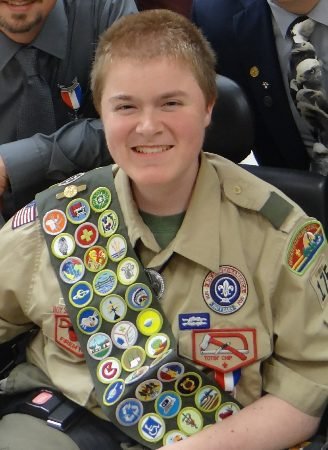Living in my patient’s shoes
Growing up, I never thought I would become a frequent visitor to the doctor or take more than 10 pills a day. Although every day comes with hardships, I feel blessed as I am able to walk in my patient’s shoes, since I have started my medical career. From kindergarten to 12th grade, I never missed a day of school and was seemingly in “perfect” health, yet there were signs along the way that maybe I was not so healthy.
As a 5-year-old, my parents were told that I used the bathroom too much in preschool. Whenever I went to the doctor, I was prescribed something that, instead of helping me, gave me terrifying nightmares. In the 5th grade, I would receive lunch detention for having to use the restroom too often during class. Every 20 minutes I felt the urge to use the restroom, and could not hold it or had micturition. It would even affect my sleep to where I would have to get up 5-6 times a night to urinate. Jokingly, I called it my “prostate” problem.
As a young girl, this was so embarrassing and I felt like I could not go on trips or sit for a long period in class. It would cause me to struggle at work or make social situations, like going on a date, all the more difficult. I would cry because the bathroom was in complete control of my life, and I had to know where it was at all times. I always had to have a map in my mind of how to get to the nearest bathroom in a moment’s notice.
One would probably wonder why for 25-years I had done seemingly “nothing” about this problem and why I let it continue to plague me and those around me. I would go to the doctor but was always told that if it was not a UTI, then it must be anxiety/depression or overactive bladder. Countless times I was offered depression medication for my symptoms. As the symptoms got worse, I started getting all the more desperate. I finally made an appointment with an OB/GYN who could refer me to a urologist. My search led me to over $2000 in labs, two pap smears, was started on expensive medications that “did nothing,” and the worst, most humiliating part of all—being catheterized four times.
Besides seeing a urologist, I also saw a cardiologist. Because I kept experiencing hypotension alongside spells of dizziness of tachycardia, I was given a heart monitor for a month. In fact, I was even wearing the monitor during my medical school interview.
After being accepted into medical school, I finally confessed to my boss, a local family physician, about my problems on the last day of work. In all those years, he was the one person who asked a simple question that changed everything. “You say you use the restroom frequently; is there a large volume or small volume every time you void?” Before I even told him all my symptoms, he asked if I had dry mouth, dizziness, or if I had to get up multiple times at night to use the restroom. After answering yes to all of these questions, he said that he knew what I had but needed to draw some labs first to prove it. Soon after the results came in, I was given a diagnosis of diabetes insipidus, a new prescription, but above that, a new life.
Since being on the medication for a few months now, I have increased doses from 1 pill to now 6 pills per day. I have to be careful of water consumption because drinking too much could lead to water toxicity. Sometimes my sodium gets too low and my legs get weak and tingly or I get very dizzy. Since no days in medical school are the same, I always have to bring my medication with me and at times have to struggle to reach the next dose, feeling the need for the next does before I can take it. Although my life has improved dramatically, each day still brings challenges.
A person can choose to focus on their problems or use those disadvantages as a strength. I choose to make it an advantage. I get to see what others do not get to see. I intimately feel what the patient does, as I have lived in their shoes. I understand the deep yearning for the doctor to listen to me and hear my plea for help. It is too easy just to say, “take this pill…it fixes your problem.” What is not always considered is that the pill may have many side effects or creates other issues that the patient has to live with. Also, if the patient has multiple diagnoses or diseases like I do, that extra pill turns into a handful, multiple times a day.
I chose to pursue medicine because I was diagnosed with hypothyroidism after seeing multiple doctors, one of which called me “just a fat freshman.” I loved the process of solving problems, ordering labs and imaging, and prescribing medications. Through having sepsis, surgery complications, beta thalassemia and arthritis, my trips to multiple doctors have exposed the darker side of healthcare where I was blamed for my problems or told that I made up my symptoms.
I want to be a patient advocate. I am fortunate to be reminded through my own everyday struggles that I too am human and my decisions deeply affect others. As a lab tech prior to medical school, I made sure to listen to the concerns of every patient, even if they just needed to talk about Fluffy, their cat, as I drew their blood.
Today as I have standardized patient encounters, I make sure to ask open ended questions and try to express empathy for the patients. I know what it is like to live with something that impacts my daily life both physically and financially. My last standardized patient told me that I was “like sunshine in the room” and that he “needed that.” I want to always be that sunshine for the patient and let them feel as though I am on their side. As a physician, I will do everything possible to make their day a little brighter because every decision I make, impacts that patient’s daily life.






